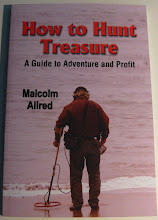Another digging buddy of mine (who contracted the disease a while after I did), once came to me with a document he’d located that described gunboat action against Confederate positions far south of Vicksburg. Since the position was very well described in the document, we investigated. On our first day out we dug three Union cannon balls, all with the brass fuses containing ordinance designation, date, and anchor icon. On subsequent trips we located over forty of the round balls along with other large caliber projectiles. Viva la research!
When I returned to Vicksburg from Greenville in 1978 I began once again to research the area for sites of battles, camps, plantations, etc. My interest was especially piqued by study of the old town of Warrenton, Mississippi, the first county seat of Warren County, which had been not only a fair-sized town, but which hosted the Confederate and Union armies during the War and was the site of at least two Confederate forts that fought numerous battles with Union gunboats during 1862 and 1863. With the possibility of finding both coins and relics of the War, I found the old town most tempting – especially since it was now open fields.
I inquired of local historians, studied old courthouse maps that showed in detail the layout of the town, and talked to locals who knew where the town was located. Soon I managed to meet the old man who was farming the fields where the now-defunct town once stood, and obtained his grudging permission to hunt the area. My assessment of the town’s treasure-hunting potential was not underestimated. Within a few days I had dug several coins from the eighteenth and nineteenth centuries, many bullets and buttons not only from the War, but which dated to the Revolutionary War and the War of 1812.
But it came to a sudden end.
One Saturday I had parked my old Bronco (the VW was long gone) alongside one of the plowed fields, turned out my two small Cairn Terriers so they could enjoy the outing with me, and was proceeding to hunt, when I heard a truck approach. I watched as the farmer arrived, and I waved a friendly salute. He was anything but friendly.
Jumping from his truck he began to curse me and my dogs. I didn’t find out until later, but this farmer was
 about as looney as a bear on psychedelic mushrooms. I couldn’t understand why he was so upset (I still don’t know why, but, then, how do you begin to understand nuts?). I tried to reason with him: “Joe (not his real name),” I said, “it’s me. Malcolm. Don’t you remember giving me permission to hunt out here?”
about as looney as a bear on psychedelic mushrooms. I couldn’t understand why he was so upset (I still don’t know why, but, then, how do you begin to understand nuts?). I tried to reason with him: “Joe (not his real name),” I said, “it’s me. Malcolm. Don’t you remember giving me permission to hunt out here?”“I don’t give a d… who you are or what I said,” he shouted, “get your g-d… dogs and get out of here.” With that, he approached one of my Cairn Terriers and kicked him. The Terrier wasn’t badly hurt, but his squeal at the time made my blood boil.
“You (censored)!” I shouted as I headed in his direction, “I’ll rip your d… head off with my bare hands!”
I wasn’t fast enough to stop him from grabbing his rifle from the floorboard of his truck. He held it up, took deliberate aim at my forehead, and said, “I’ll shoot you square between the eyes, you (censored), if you don’t take that back.”
Now, I must admit, I go a little crazy when I’m threatened, and my actions now confirmed it, because I said, very clearly, “You (censored). I’ll leave, but only because you’ve got a gun and I don’t.”
He kept the rifle trained on me as I loaded my dogs and drove away.
I wasn’t about to give up on this spot. The possibilities were just too great. So I (and Pete Shead) again did some research, this time to find out who owned the land upon which old Warrenton once existed. We found that the lots that had originally been laid out were still extant, even after all these years, and that they were owned by many different people and companies. We called them, one by one, and asked if they were willing to sell. We were in luck. We found one owner who was quite willing. And he owned the bulk of the lots upon which most of the houses of Warrenton had been built!
BUY! If you want the best of all relic-hunting experiences – the ability to hunt at will, to deny others the same right, the leisure of doing it whenever you want without fear of conflict, BUY THE LAND UNDER WHICH THE RELICS LIE!
I did. And when that inevitable day came when the then-irate-now-docile farmer drove up, got out of his truck, and meekly asked if I was the one who had bought the land down here… JOY! And I told him to leave my property, and never set foot on it again. JOY!
Before he left, he looked at me and he said, “You know, you’re crazy.”
“Yep,” I answered, smiling. “I am crazy.”
In subsequent years I and my hunting buddies dug many relics from the house sites, camps, and forts that were old Warrenton; more on these later.



No comments:
Post a Comment